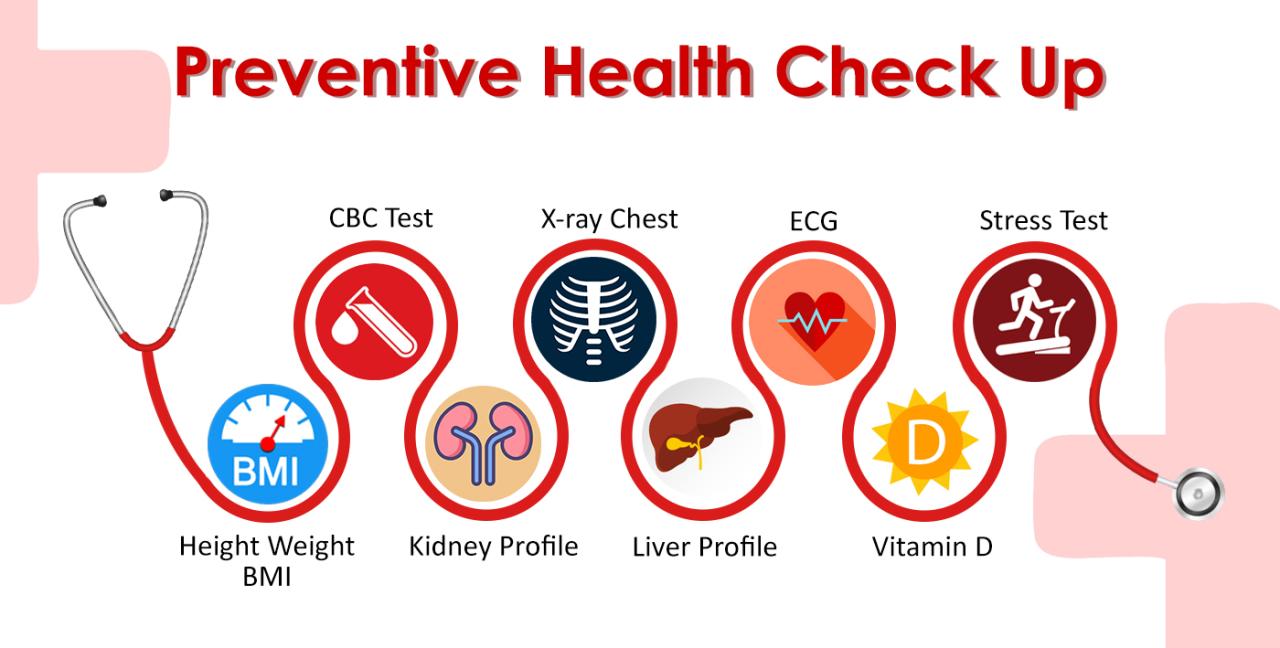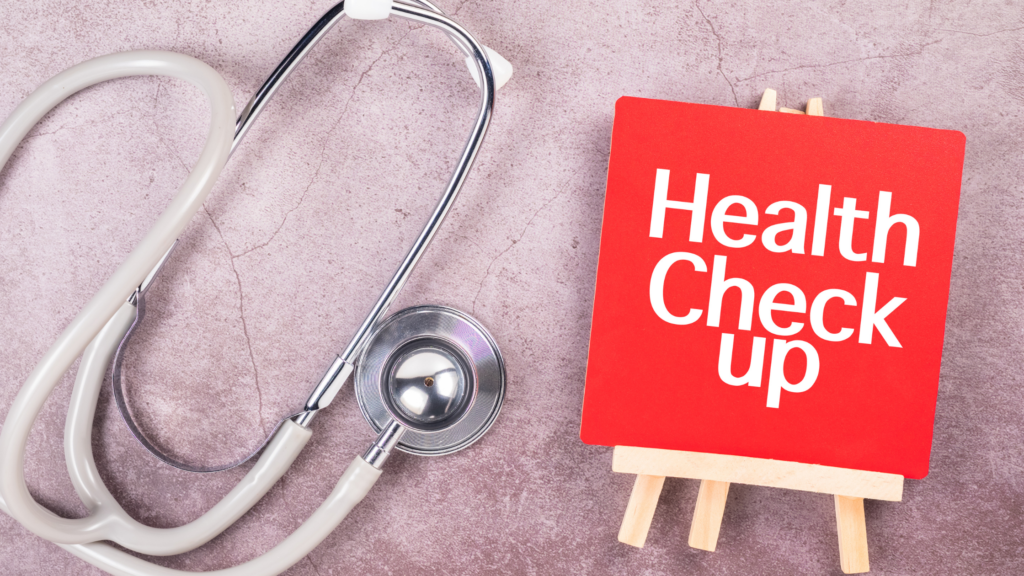Preventive Health Checkups: What You Need to Know

Exploring the realm of Preventive Health Checkups: What You Need to Know, this title sets the stage for a deep dive into the world of proactive healthcare. Brace yourself for a journey filled with valuable insights and practical tips.
In the following paragraphs, we will delve into the importance of preventive health checkups, their benefits, various types available, preparation tips, what to expect during checkups, and common misconceptions surrounding them.
Introduction to Preventive Health Checkups

Regular preventive health checkups are essential for maintaining overall well-being and catching potential health issues early on. By undergoing routine screenings and tests, individuals can detect any underlying health problems before they escalate, leading to better treatment outcomes and improved quality of life.
Examples of Common Preventive Health Checkups
- Annual physical exams: These checkups typically include measurements of vital signs, such as blood pressure, cholesterol levels, and weight, as well as discussions about lifestyle habits and any concerning symptoms.
- Mammograms and Pap smears: These screenings are crucial for women to detect breast and cervical cancer early on when they are more treatable.
- Colonoscopies: Recommended for individuals over a certain age, colonoscopies help in the early detection of colorectal cancer.
Contribution to Overall Well-being
Regular preventive health checkups play a significant role in promoting overall well-being by allowing healthcare providers to monitor a person's health status, identify risk factors for diseases, and provide timely interventions. By staying proactive about their health, individuals can take control of their well-being and work towards leading healthier lives.
Benefits of Preventive Health Checkups
Regular preventive health checkups offer numerous benefits that can contribute to overall well-being. By undergoing routine screenings and tests, individuals can stay on top of their health and address any potential issues before they escalate. Here are some key advantages of preventive health checkups:
Early Detection of Health Issues
Regular preventive health checkups play a crucial role in the early detection of various health issues. By identifying potential problems in their initial stages, individuals can seek timely treatment and prevent the progression of diseases. This can significantly improve the chances of successful outcomes and reduce the risk of complications.
Cost-Effective in the Long Run
Preventive health checkups can also help save money in the long run by addressing health issues before they become more serious and require expensive treatments. Detecting and managing conditions early on can prevent the need for costly interventions and hospitalizations.
Investing in preventive care can lead to better health outcomes and reduce healthcare expenses over time.
Types of Preventive Health Checkups

Regular preventive health checkups are essential for maintaining overall health and detecting any potential issues early on. There are different types of preventive health checkups available, each serving a specific purpose in ensuring well-being.
General Health Screenings vs. Disease-Specific Screenings
General health screenings involve checking vital signs, cholesterol levels, blood sugar, and overall organ function to assess the overall health status. These screenings help in identifying any underlying health issues that may require further investigation or treatment.On the other hand, disease-specific screenings focus on detecting particular diseases or conditions based on risk factors, family history, or age.
Examples include mammograms for breast cancer, colonoscopies for colon cancer, and prostate-specific antigen (PSA) tests for prostate cancer. These screenings are tailored to specific diseases to ensure early detection and timely intervention.
Importance of Age-Appropriate Preventive Health Checkups
Age-appropriate preventive health checkups are crucial as our health needs change over time. For example, children may require regular vaccinations and growth monitoring, while adults may need screenings for conditions like diabetes, hypertension, and cholesterol levels. As we age, additional screenings such as bone density tests for osteoporosis and eye exams for vision changes become important to maintain optimal health and quality of life.
How to Prepare for Preventive Health Checkups

Before going for a preventive health checkup, it is essential to make some preparations to ensure a smooth and successful examination. Follow these guidelines to prepare yourself effectively:
Checklist for Preparing for Preventive Health Checkups
- Confirm the date and time of your appointment.
- Double-check if there are any specific fasting requirements for the tests you will be undergoing.
- Bring a list of current medications you are taking, including supplements.
- Wear comfortable clothing that is easy to remove for certain examinations.
- Stay hydrated but avoid heavy meals before the checkup.
Fasting Requirements for Specific Checkups
- For blood sugar tests, fasting for at least 8 hours is usually required.
- For lipid profile tests, fasting for 9-12 hours is recommended.
- For certain imaging tests like ultrasound or CT scan, fasting may not be necessary, but follow your healthcare provider's instructions.
Importance of Bringing Medical History and Relevant Documents
It is crucial to bring your medical history and relevant documents to the checkup to provide your healthcare provider with a comprehensive overview of your health. This information can help in accurate diagnosis, treatment planning, and monitoring of your overall well-being.
Make sure to carry:
- Previous medical reports and test results.
- List of any known allergies or existing medical conditions.
- Health insurance information.
- Contact details of your primary care physician.
What to Expect During Preventive Health Checkups
When you go for a preventive health checkup, you can expect a series of routine tests and screenings to assess your overall health and detect any potential issues early on. It is essential to communicate openly with your healthcare providers during the checkup to ensure that they have all the necessary information to provide you with the best possible care.
Following up on any recommendations or referrals after the checkup is crucial to maintaining your health and addressing any concerns that may arise.
Typical Procedures Involved in a Preventive Health Checkup
During a preventive health checkup, you can expect to undergo various tests, screenings, and assessments based on your age, gender, medical history, and lifestyle factors. This may include measurements such as blood pressure, cholesterol levels, body mass index (BMI), and blood sugar levels.
Additionally, your healthcare provider may recommend specific screenings such as mammograms, colonoscopies, or Pap smears based on your age and risk factors.
Importance of Communicating Openly with Healthcare Providers
It is crucial to communicate openly with your healthcare providers during the checkup, as this can help them understand your health concerns, lifestyle habits, and family history better. By sharing relevant information about your health, you enable your providers to make informed decisions about your care and recommend appropriate preventive measures or treatments.
Significance of Following Up on Recommendations
After completing your preventive health checkup, it is essential to follow up on any recommendations or referrals provided by your healthcare provider. Whether it's scheduling additional tests, making lifestyle changes, or seeking further treatment, following through with these recommendations can help you address any underlying health issues and prevent potential complications in the future.
Common Misconceptions about Preventive Health Checkups
Regular preventive health checkups are essential for maintaining overall health and well-being. However, there are several common misconceptions that may deter individuals from scheduling these important screenings. Let's debunk some of these myths and shed light on the importance of preventive health checkups.
Misconception: Preventive health checkups are only necessary when you feel sick
- Some individuals believe that they only need to see a doctor when they are experiencing symptoms or feeling unwell. However, preventive health checkups are designed to detect potential health issues before they become serious or symptomatic.
- Regular screenings can help identify risk factors early on and allow for timely intervention, ultimately preventing the development of chronic conditions.
Misconception: Preventive health checkups are expensive and unnecessary
- While cost may be a concern for some, many health insurance plans cover preventive services at little to no cost to the individual.
- Investing in preventive health can actually save money in the long run by avoiding costly treatments for advanced illnesses that could have been prevented.
Misconception: Preventive health checkups are time-consuming and inconvenient
- Scheduling regular checkups may seem like a hassle, especially for those with busy schedules. However, prioritizing preventive care can actually save time by addressing health concerns proactively rather than dealing with more serious issues later on.
- Many healthcare providers offer flexible appointment options and online scheduling to accommodate busy lifestyles.
Misconception: Preventive health checkups are only for older adults
- While age-specific screenings may vary, preventive health checkups are important for individuals of all ages. Early detection and prevention are key in maintaining good health throughout life.
- Younger adults can benefit from screenings for conditions like high blood pressure, cholesterol, and diabetes, which can impact long-term health outcomes.
Final Conclusion
As we reach the end of this discussion on Preventive Health Checkups: What You Need to Know, remember that taking charge of your health is a proactive step towards a better quality of life. Stay informed, stay healthy.
Answers to Common Questions
What age should I start getting preventive health checkups?
It's recommended to start regular preventive health checkups in your 20s, but this may vary based on individual health history and risk factors. Consult with your healthcare provider for personalized advice.
Are preventive health checkups covered by insurance?
Many insurance plans cover preventive health checkups as they are crucial for maintaining overall health and preventing future health issues. Check with your insurance provider to understand your coverage.
How often should I schedule preventive health checkups?
The frequency of preventive health checkups can vary based on age, gender, and individual health risks. Generally, it's recommended to have an annual checkup, but follow your healthcare provider's guidance for a personalized schedule.




